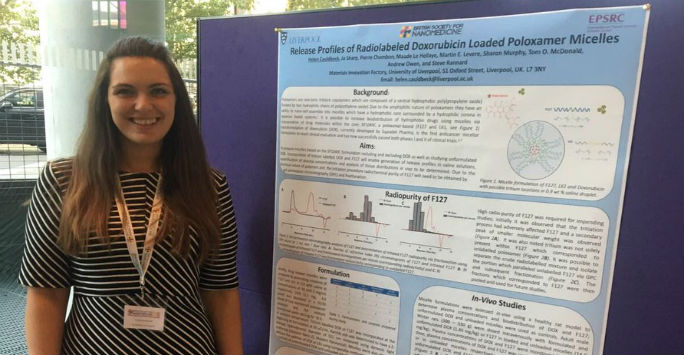Dr Helen Cauldbeck has been instrumental in establishing the University’s Research Staff Association (RSA) and engaging with the wider early career researcher (ECR) community, and cites this activism alongside the development opportunities she has accessed as a major contributor to her fellowship success.
Helen’s research is interdisciplinary in nature, and has previously seen her work between the School of Physical Sciences and Department of Musculoskeletal and Ageing Science, on treatment of glaucoma to contribute to healthy ageing, and nanomedicine for the treatment of cancer.
Contracts allow for development
Through Helen’s involvement with UK Research Staff Association (UKRSA), where she was North West representative and later Chair, she became aware of the principles of the Concordat for the development of researchers, to which the University aligns.
One aim is to ensure researchers are given the time for development. She said: “I think I was extremely lucky to have PhD and PDRA supervisors who allowed me to work flexibly in conducting research and professional development endeavours.
“I have been encouraged to attend conferences, completed the University’s Teaching for Researchers course and attended British Council and Royal Society of Chemistry funded places at UK-India Researcher Links Workshops.
“I have also undertaken the invaluable Springboard Development Programme where I met fellow women from across the University and gained different perspectives on career options.
“Attending coaching sessions provided by the School of Physical Sciences enabled me to build confidence and gain clarity on my career and personal goals.”
Supporting colleagues
Helen worked with The Academy to set up the University of Liverpool RSA as its first chair. She facilitated a session specifically focussed on the Concordat’s Statement of Expectations, to help disseminate this information to researchers across the University.
Helen said: “We set up the committee structure to ensure information was being disseminated both to the RSA from the forums and vice versa.
“Through the RSA we organised a conference which was focussed on careers in academia with a panel discussion from PIs. We also run lunch and learn sessions every 6 weeks which discuss various development opportunities such as the University’s mentoring scheme.”
Helen describes the University’s mentoring scheme as ‘brilliant’. She said: “It made me take time out of my day to think about the bigger picture, career goals and then go and discuss these with my mentor Professor Rachel Williams who provided invaluable advice and support.”
Society membership and placements

Helen say membership of societies has opened up valuable networks of experts who can offer career or technical advice.
She said: “I have been encouraged to join many different societies such as the British Society for Nanomedicine - of which I am a founding member and member of the executive group. I am a member of the Royal Society of Chemistry, The Society for Radiological Protection and Association of University Radiation Protection Officers.”
“I also applied and was awarded the School of Physical Sciences Postdoc Development Award which enabled me to undertake a 3-week industrially based work placement. One of my first post-doc contracts was on an Impact Acceleration Grant which was supported by Fluoron, a company who were interested in the patents filed from my PhD work. Throughout my PhD we were in discussions with Fluoron to understand the industrial need and translation of the materials I was generating.”
Helen received the ECR and Returners fund from the University in December 2017 to establish collaborations with Professor Ryan Donnelly at Queen’s University Belfast and the School of Physical Sciences Post-Doctoral Development Award (March 2018) to visit Aberdeen Radiation Protection Services. This was very useful to be able to discuss in my fellowship interview.
The University provides high quality development opportunities to empower every individual to foster their potential. You can learn more about The Academy’s professional development offering here.
Back to: Research